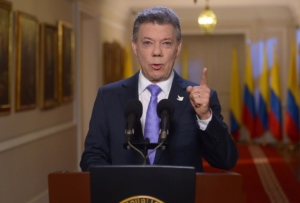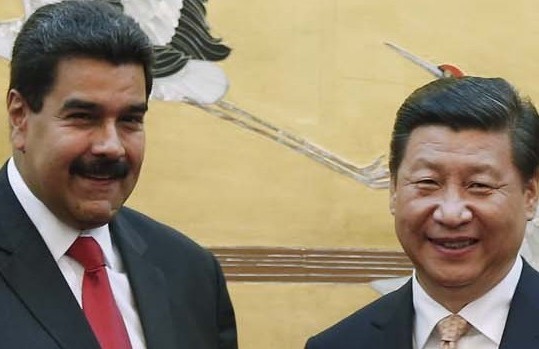China’s Appetite for Risk in Venezuela
Venezuelan president Nicolas Maduro left China last month with a supposed show of support from the Chinese government.
This post is also available in: Spanish
Diplomatic relations between Venezuela and Colombia are at their most tense in recent decades — due to the decision by Venezuelan President Nicolas Maduro to close the border with Colombia and order the deportation of Colombian citizens residing illegally in Venezuela.
What is seen in Caracas as a reasonable response to trafficking and undocumented migration is, for Bogotá, nothing more than a xenophobic overreaction. The Venezuelan government closed the border following an armed confrontation between a Venezuelan military patrol and alleged Colombian paramilitaries, ostensibly working for trafficking networks inside the country. Furthermore, Maduro has argued that the decision is necessary to control a massive exodus of Colombians to Venezuela. Currently, more than 1,400 Colombians have been deported and more than 18,000 have left Venezuela on their own accord because of heavy security operations. Hundreds of homes have been destroyed in the process.
Although the bilateral relationship between the two countries has faced periods of crisis in the past, the humanitarian scope of the current situation is unprecedented.
Although the bilateral relationship between the two countries has faced periods of crisis in the past, the humanitarian scope of the current situation is unprecedented. Additionally, the feeble reactions from the two principal regional organizations — OAS and UNASUR — reveals the deep failures of regional integration in Latin America. After the border closure, Colombia announced a diplomatic offensive to protest the mass deportations. Bogotá’s strategy, however, suffered a serious defeat at the OAS, lacking the votes necessary to convene a meeting of foreign ministers to discuss the crisis. 11 countries abstained from voting — including Argentina and Brazil — while other allies of Venezuela, notably Bolivia and Ecuador, rejected the proposal outright. Moreover, on Saturday the foreign ministers of both countries met in Quito, under the mediation of Ecuador and Argentina (as presidents of UNASUR and CELAC, respectively), without any tangible results.

It is important to note that the OAS, in particular, was conceived as a regional mechanism for conflict resolution in the hemisphere. The Pact of Bogotá, the founding treaty of the OAS, defined strengthening peace and security in the Americas as one of its essential purposes. Indeed, in an attempted show at mediation, the OAS Secretary General Luis Almagro visited Cúcuta, the Colombian city where most of the displaced Colombians have settled.
Overall, the implications of the crisis are numerous. First, it represents an unprecedented level of conflict and escalation between Venezuela and Colombia. The normalization of the diplomatic relations with Venezuela has been a priority for the Santos government in Colombia—reflected in Venezuela’s much discussed observer status in the ongoing peace talks with the FARC in Havana. Undoubtedly, the crisis represents a serious setback for Santos’ attempts to build a pragmatic relationship with Venezuela.
Further complicating the situation, the relationship between Colombia and Venezuela is historically characterized by a permanent flow of migrants and deep commercial ties. According to the latest study issued by the Economic and Social Policy Council in Colombia (CONPES), Venezuela is catalogued as one of the chosen destinations for Colombian migrants. In addition, the National Department of Statistics in Colombia (DANE) reports the country’s exports to the Bolivarian Republic at over $600 million USD annually. The commercial relationship between Colombia and Venezuela is considered a “learners-market” in which both exporting industries exchange experiences, offer new products, and seek mutual benefits.
The inability of the OAS Permanent Council to convene an emergency meeting is a troubling indication of a near-total lack of political will on the part of its member states.
In this complicated and pressing context, the inability of the OAS Permanent Council to convene an emergency meeting is a troubling indication of a near-total lack of political will on the part of its member states. At the same time, Bogotá’s refusal to discuss the situation within UNASUR shows that the organization is not yet a viable alternative. The Brazilian and Argentinian foreign ministers attempted to initiate mediation between the nations, while Ecuador and Uruguay also offered to play this role, but their efforts have so far been unsuccessful. The lack of a coherent regional strategy to deal with the crisis shows a deficit of leadership and cooperation, one that a proliferation of multilateral institutions, including UNASUR and CELAC, has not been able to overcome.
In other parts of the world, including the United States, blaming undocumented migrants for domestic problems has proved to be electorally profitable. Translating this logic into the region — where millions of citizens reside in other Latin American countries — could present serious consequences.
The decision to close the border and expel hundreds of Colombians—and the reasons given by Venezuela for these actions — may serve as a dangerous precedent for the region. The migratory tensions between the Dominican Republic and Haiti show clear evidence of this fact. In other parts of the world, including the United States, blaming undocumented migrants for domestic problems has proved to be electorally profitable. Translating this logic into the region — where millions of citizens reside in other Latin American countries — could present serious consequences.
How this situation develops in the coming weeks will determine the fate of millions of Colombians living in Venezuela, as well as the stability of both nations and perhaps the viability of regional integration in Latin America.
Venezuelan president Nicolas Maduro left China last month with a supposed show of support from the Chinese government.
Most reports following Hugo Chavez’s death conclude that little will change with respect to the China-Venezuela relationship.
Venezuelan President Nicolas Maduro this month made a three-day visit to China, his first official state trip abroad since taking office.
